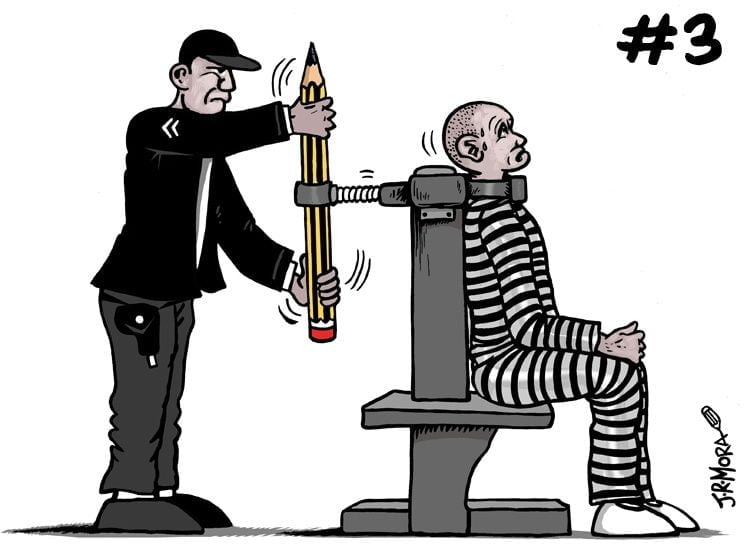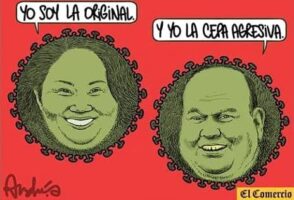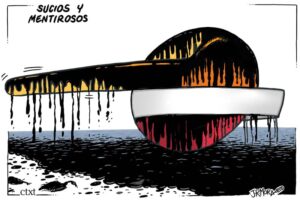
Description and translation of the cartoon.
Title: "Learn to tell them apart (Don't get confused)
From left to right:
Police 1: "delinquent in a policeman's suit"
Police 2: "delinquent policeman"
Police 3: "Policeman doing his duty"
This cartoon by Carlos Tovar Samanez, "Carlín", (Lima, 1955), published in the newspaper La República on 30 January provoked a response from the Peruvian National Police (PNP) in the form of a communiqué announcing a lawsuit against the newspaper and "those responsible".
In the scene, under the headline "Learn to tell them apart (don't get confused), the illegal activities of both police who commit crimes and those criminals who disguise themselves as law enforcement officers (it is said that they even rent their uniforms) are pointed out.
As usual, the police consider their institution to be sacred and cannot allow any criticism.
Moreover, the PNP, in a display of authoritarianism, believes it can silence any opinion based on something as ambiguous and empty as the "legal protection of its institutional image".

The reaction to this threat has been the usual and expected one. In addition to the inevitable mass dissemination of Carlín's cartoon, several colleagues in the profession have devoted their cartoons to the issue in support of Carlín.

Cartoon by Andrés Edery, cartoonist at the newspaper El Comercio.

Cartoon by Lucho Rossell

Two cartoons by Diego Avendaño

The National Association of Peruvian Journalists, ANP, rejected the PNP's threats as an attack on freedom of expression and made this known in a communiqué:
"The National Association of Journalists of Peru rejects the tacit threat of the National Police of Peru to take Carlos Tovar Samanez (Carlín) and the newspaper La República to court for a cartoon that satirizes the actions of some members of the National Police of Peru (PNP).
The police institution is unaware that humour has preferential protection as a legitimate expression of freedom of expression/opinion. A truly democratic system is based on tolerance of critical artistic expression, which is alien to the person who wrote the police statement".
The Instituto Prensa y Sociedad (IPYS), which considers the PNP announcement to be a threat to freedom of expression,expressed itself in the same terms.
On 30 January 2024, the Peruvian National Police issued a communiqué rejecting a cartoon by cartoonist Carlos Tovar "Carlín", published in the newspaper La República, which criticises the institution by showing three police officers, describing two of them as "criminals".
The communiqué expresses the complaint that the drawing "ridicules the image of the police" and is therefore "categorically rejected" as an "affront".
The letter announces that the Ministry of the Interior has been ordered to initiate "legal action against the media and against those responsible".
The legal adviser of IPYS, lawyer Roberto Pereira, clearly stated that this is a nonsense "considering that the cartoon contains a strong critical content of a public institution that has been strongly questioned by objective and verifiable facts".
IPYS rejects the police authority's announcement, considering it a threat to freedom of expression.
Pedro Vaca, Special Rapporteur for Freedom of Expression of the Inter-American Commission on Human Rights, has also expressed his opinion, describing the PNP's response as a worrying attack on freedom of expression:
"A caricature does not affect the "institutional image" of an entity. Eroding the space for humour about authority does severely harm freedom of expression. When humour worries the authority, it is because the reflection it wants to provoke is relevant".
Carlín, for his part, assures that the scene he depicts in his cartoon is an everyday situation:"it's something that everyone sees every day", and considers that the PNP has tried to attack his freedom of expression, but that the threat of a lawsuit will remain an attempt.
Carlín answers and finishes off, for the moment, with this cartoon from February 1 in La República. At the same time he warns that he will not listen to threats.

However, contrary to what Carlín believed, the PNP ordered him to "rectify" and apologise within 48 hours by means of a notarised letter.


In 2020, Carlín was involved in another row when he received insults and serious threats for a cartoon published in La República, the newspaper he has worked for since 2002.
Humour in trouble, a collection of cases (III)
Cases of cartoonists who have had problems of some importance because of their cartoons or satirical illustrations. There are also some stories of other people who, without being cartoonists, have got into trouble for sharing them.








